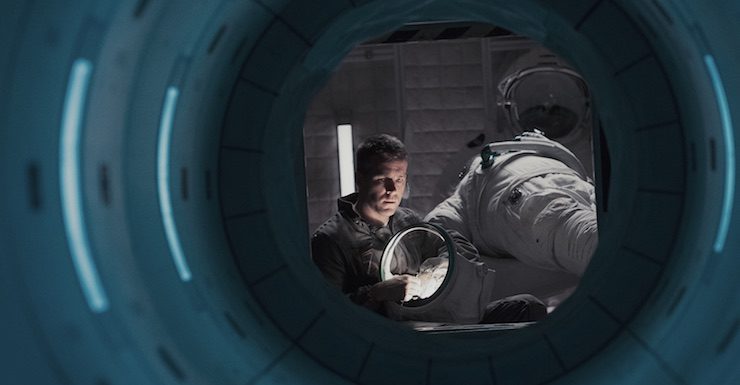Alien casts a very long shadow. Ever since Ridley Scott’s movie came out (a frankly horrifying number of years ago), its long, spiky fingerprints have been all over science fiction horror cinema. People in jumpsuits, interpersonal conflict, a betrayal or three, a near total party kill, an action sequence in a near vacuum, aaaaaaaand scene! Relatively easy to replicate, not so easy to build upon, although several notables have tried. Personally, I like the hard left turn that Event Horizon takes into full-on horror, for example, but it’s an acquired taste.
So, if anything you do as a filmmaker is going to be compared to Alien or its ilk, you’re faced with two choices. Either do something as original as possible, or make the best possible version of the movie that people are expecting to see.
Life does the latter. And still throws in a couple of surprises along the way.
The level of talent, both in front of and behind the camera, here, is the first good sign. Director Daniel Espinosa is best known for Safe House, which cleverly subverted both the spy thriller and the “locked in with something or someone terrible” subgenre. His star in that movie, Ryan Reynolds, is also one of the stars here. The screenwriters, Rhett Rheese and Paul Wernick have written, amongst other things, Deadpool, so Reynolds is on strong ground from the get-go, and the movie makes very good use of his freeform comedy skills and ability to project a sense of fundamental decency.
The cast impresses throughout. Olga Dihovichnaya is excellent, if somewhat underutilized, as Mission Commander Ekaterina Golovkina. The always reliable Hiroyuki Sanada is equally underused but does good work with what he’s given. This is one point where the movie fails, setting up a principle cast of six and using two of them as merely window dressing far too often. That being said, Golovkina does get one of the standout moments of the movie basically to herself.
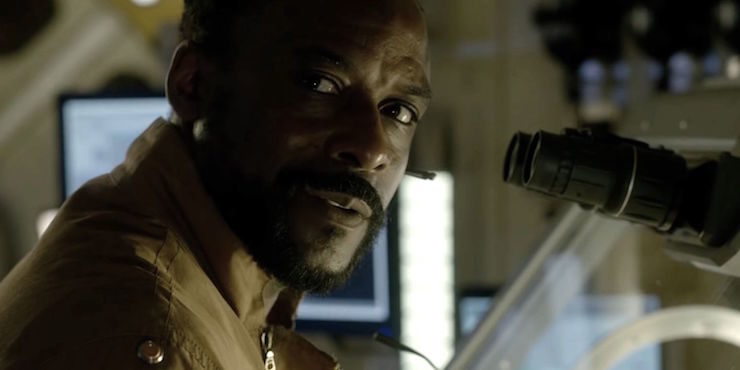
The rest of the cast do the heavy lifting, and each actor is more than up for the task. The breakout star here is Ariyon Bakare as scientist Hugh Derry. Hugh is one of the hubs the movie turns around, though on paper he’s little more than the standard driven, high-strung scientist. In reality, he’s a man struggling to carry the weight of the world’s expectations, whose need to know and to discover threatens to outstrip his own sense of self-preservation. He’s almost a Renfield figure in the film, a zero gravity Oppenheimer consumed with accomplishment but haunted by the reality of its consequences. Jurassic Park’s Ian Malcolm would be proud. And horrified.
Bakare’s grounded, nuanced performance is the perfect front line between the crew and the movie’s monster, an alien organism called Calvin (more on that in a bit). It’s also balanced by Reynolds as Rory Adams, the Flight Engineer. The friendship between the two comes across as genuine and funny, and it gives the serious moments real heft. The point where Rory warns Hugh “You’re drunk on this.” is particularly good. Also, crucially, Hugh learns from it. This isn’t a movie where people die because the plot demands that they be stupid, or act stupidly. It’s one in which people die because human nature and random chance lead to it. In a genre that could have singlehandedly invented the concept of the idiot ball, that’s a rare treat.
The movie’s spotlight is shared by these two (Bakare and Reynolds) along with Rebecca Ferguson and Jake Gyllenhaal. Gyllenhaal plays Chief Medical Officer David Jordan, the soon-to-be owner of the long duration spaceflight record and a quiet, buttoned-down man. This is Gyllenhaal at his most understated, and David’s arc across the movie is arguably its subtlest. He’s quiet and wounded and just a little spiky and one of the most interesting protagonists this sort of film has had in ages.
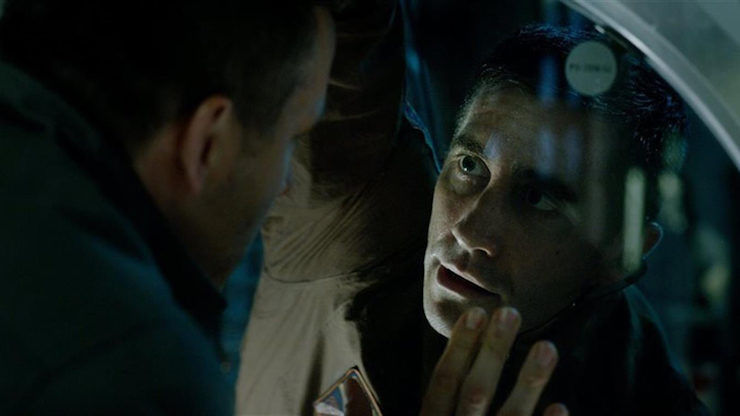
Ferguson’s Doctor Miranda Frost is another pleasant surprise. As the CDC specialist in charge of containment procedures, she could so easily have been a cardboard cut-out. Frost could have been Aliens’ Carter Burke by way of Elysium’s Delacourt: an ice queen more concerned with containment than humanity. Instead, she’s a career medic whose life has been spent guarding the wall between us and viral death, a member of the ISS family, and a woman with arguably more agency than anyone else in the film. Ferguson is an effortlessly impressive performer and her work here, especially when surrounded by big personalities like Gyllenhaal’s and Reynolds’ characters, holds your attention every time.
In short, the human dimension of Life is rock solid—but these movies fall apart if the monster doesn’t work. Named Calvin by high schoolers back on Earth, the alien is a little like an aerial starfish made of brain and gristle. It’s a beautiful, simple, frightening design and there are some great moments where its presence is only given away by the skittering noise it makes as it bounces off bulkheads. Its later form is great fun, too, combining the grace of a manta ray with a malicious, skeletal feel that’s far more brawny and dangerous than the CGI effects might lead you to expect.
But the real reason Calvin is memorable is that he’s clever—the MacGuffin is that every one of his cells acts as brain, muscle, and eye all at once, and you never doubt any of those elements. His first attack is a bone-snappingly memorable one, as is his last, but there’s a moment involving a glove box and tool use that will haunt your nightmares. Likewise, the contractually-obligated EVA sequence goes places I’ve never seen this sort of movie go, and that’s all down to Calvin, the threat he poses, and the intelligence he possesses.
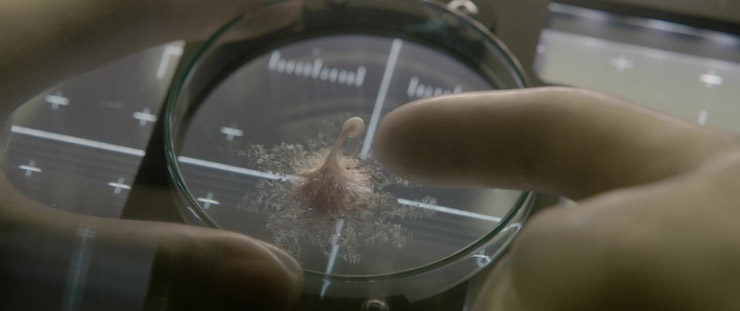
The last hurdle every commercial horror movie released in the West faces can be summed up in three words at the end:
“OR IS IT?!”
We all know it: that terrible fake-out moment, just when it seems safe to think that it’s all over, where the happy ending rolls just a little too long, your heart begins to sink and you watch as the bad guy somehow gets up, or is resurrected, or waits patiently for a dog to pee fire on his grave so that he can rise from it. I work with horror fiction for my day job and I can honestly say the contractually-obligated “OR IS IT?!” twist is the one thing certain to turn me off a story for good.
Without spoiling anything: Life does not do that. It does something which is both absolutely above-board and perhaps just a little bit of dirty pool, at the same time, but nothing in the ending feels unearned or out of context. It’s very satisfying and still somehow, maybe, opens the door to a possible follow-up. Or perhaps not. To say more would spoil the surprise and, for once, this is a surprise worth experiencing.
That’s my big takeaway from Life: this is a movie that’s exactly what you expect it to be, but it’s executed so well that you’re going to have fun with it. There are at least two things I’ve not seen done before in the venerable subgenre of PERIL! IN! SPACE! movies, and the cast and crew are absolutely topflight. Its monster, like the movie itself, is smart, nasty, inventive, and fun. I should also note, with Alien: Covenant coming down the line shortly, that Life is a surprisingly hard act to follow. Here’s hoping that Ridley Scott and company can escape that long shadow, too.
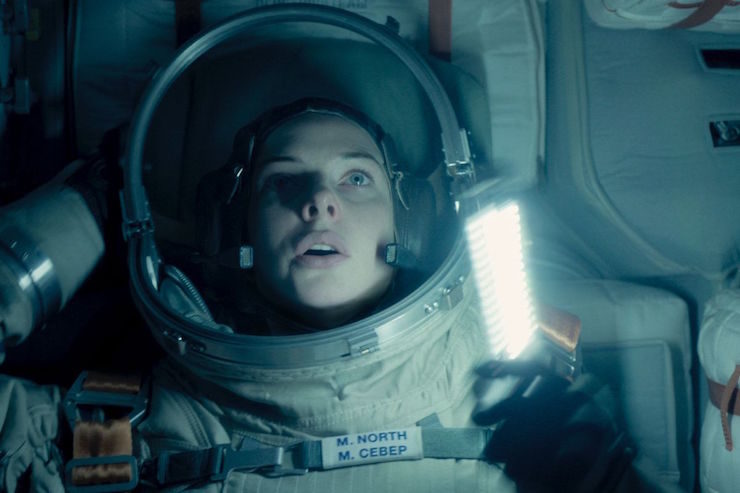
Alasdair Stuart is a freelancer writer, RPG writer and podcaster. He owns Escape Artists, who publish the short fiction podcasts Escape Pod, Pseudopod, Podcastle, Cast of Wonders, and the magazine Mothership Zeta. He blogs enthusiastically about pop culture, cooking and exercise at Alasdairstuart.com, and tweets @AlasdairStuart.










